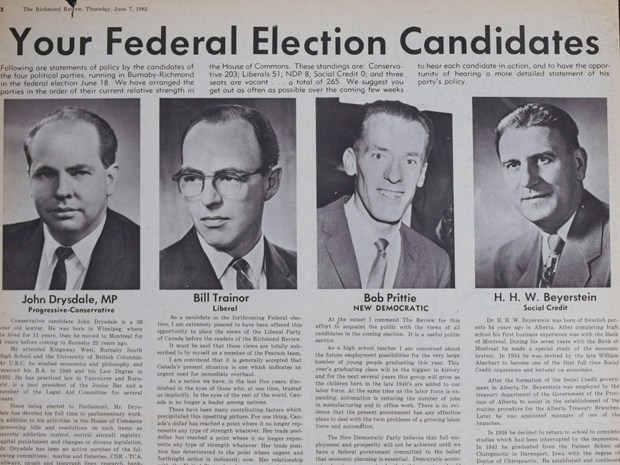They became the Official Opposition in the House of Commons in 2011. They handed Conservatives a crushing defeat in Alberta just months ago. But New Democrats have had it tough in Richmond throughout history.
Except for Bob Prittie.
Prittie made history in 1962, becoming Richmond’s first federal Member of Parliament to represent the New Democratic Party or its left-leaning predecessors.
And he did it during the new party’s inaugural election.
Robert William Prittie sailed into a seat in the riding then known as Burnaby-Richmond under the NDP banner. Prittie went on to win two more elections, representing the Island City until his defeat in 1968.
Since then, no federal NDP candidate has won an election in Richmond.
Before politics, Prittie, who died in 2002 at age 82, served overseas with the Royal Canadian Air Force during the Second World War. He later worked as a foreign service officer for Canada, then became a high school teacher in Burnaby, according to Library of Parliament records.
He served briefly as a municipal councillor in Burnaby before entering federal politics. He ran, unsuccessfully, with the Co-operative Commonwealth Federation in 1957 and 1958, coming close each time.
Prittie put his hat into the ring again in 1962. In a published platform ahead of the June 18 vote, Prittie keyed on bleak employment prospects for young people, blaming automation for reducing jobs in manufacturing and offices.
“The New Democratic Party believes that full employment and prosperity will not be achieved until we have a federal government committed to the belief that economic planning is essential.”
He also criticized rival parties for accepting corporate donations, dismissed the notion of supplying the Canadian armed forces with nuclear weapons and sang the praises of public health care.
“Sooner or later we shall have a complete medical insurance plan. Sooner if we have a New Democratic government, because we believe in the principle, and later if the other parties form our government. They will act only when forced to do so.”
His platform, and that of party leader Tommy Douglas, resonated with local voters. Prittie won with 38.6 per cent of the vote, followed by Liberal rival Bill Trainor, Progressive Conservative incumbent John Drysdale and Social Credit candidate Hilliard Beyerstein.
Richmond Coun. Harold Steves remembers working on Prittie’s 1962 campaign. Steves was in charge of silkscreen printing for the candidate’s signs.
“That was the first election I ever got involved in,” he said.
Steves said the NDP, and the CCF before it, appealed to rural voters — and rural was what Richmond was at the time.
John Diefenbaker’s Progressive Conservatives ended up winning the 1962 election, and the NDP finished with just 19 seats. But the minority government proved unstable and lasted just 132 days, according to Parliament records.
Prittie served as Richmond’s MP until 1968, when he was defeated by Liberal Tom Goode. Prittie then returned to civic politics, serving as Burnaby’s mayor for five years.
John Reynolds, a longtime Conservative politician who represented Richmond in the House of Commons in the 1970s, narrowly prevented a return of an NDP MP in 1972. Running for the Progressive Conservatives, he beat NDP challenger Ken Novakowski by just 1,440 votes.
“Richmond was quite small compared to today,” he told the Richmond News. “We built a good base with young families.”



